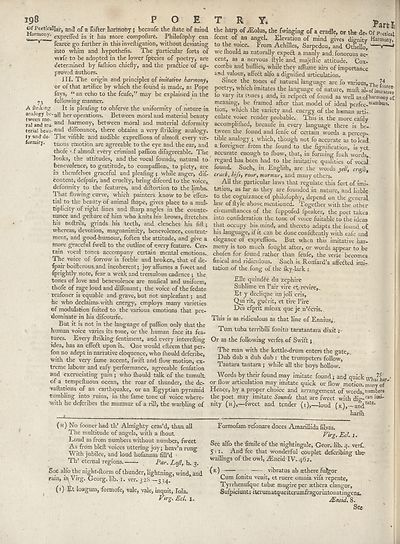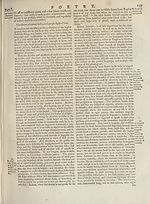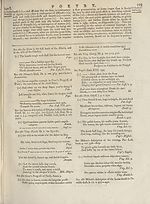Encyclopaedia Britannica > Volume 15, PLA-RAM
(236) Page 198
Download files
Complete book:
Individual page:
Thumbnail gallery: Grid view | List view

198 POE
Of PretlcalJar, and of a fofter harmony; becaufe the ftate of mind
Harmony. eXpreffe(j Jn has more compofure. Philofophy can
' ~ fcarce go further in this inveftigation, without deviating
into whim and hypothefis. The particular forts of
vcirfe to be adopted in the lower fpecies of poetry, are
determined by fafliion chiefly, and the practice of ap¬
proved authors*
III. The origin and principles of imitative harmony,
or of that artifice by which the found is made, as Pope
fays, “ an echo to the fenfe,” may be explained in the
7 3 following manner.
A ftnlong It is pleafing to obferve the uniformity of nature in
analogy her operations. Betv/een moral and material beauty
tal and roa anc* harmony, between moral and material deformity
terial beau- and diflbnance, there obtains a very linking analogy,
tynndde- The vifible and audible expreffions of almoft every vir-
fornaity. tuous emotion are agreeable to the eye and the ear, and
thofe ' f almolt every criminal paffion difagreeable. The
looks, the attitudes, and the vocal founds, natural to
benevolence, to gratitude, to compaflion, to piety, are
in themfelves graceful and pleafing ; while anger, dif-
content, defpair, and cruelty, bring difcordto the voice,,
deformity to the features, and diftortion to the limbs.
That flowing curve, which painters know to be eflen-
tial to the beauty of animal Ihape, gives place to a mul¬
tiplicity of right lines and lharp angles in the counte¬
nance and gelture of him who knits his brows, ftretches
his noftrils, grinds his teeth, and clenches his fill;
whereas, devotion, magnanimity, benevolence, content¬
ment, and good-humour, foften the attitude, and give a
more graceful fwell to the outline of every feature. Cer¬
tain vocal tones accompany certain mental emotions.
The voice of fon-ow is feeble and broken, that of de¬
fpair boifterousrand incoherent j joy alfumes a fweet and
fprightly note, fear a weak and tremulous cadence ; the
tones of love and benevolence are mufical and uniform,
thofe of rage loud and dilfonant; the voice of the fedate
reafoner is equable and grave, but not unpleafant; and
he who declaims v/ith energy, employs many varieties
of modulation fuited to the various emotions that pre¬
dominate in his difcourfe.
But it is not in the language of pafixon only that the
human voice varies its tone, or the human face its fea¬
tures. Every linking fentiment, and every interelling
idea, has an effedl upon it* One would elleem that per-
fon no adept in narrative eloquence, who Ihould defcribe,
with the very fame accent, fwift and flow motion, ex¬
treme labour and eafy performance, agreeable fenfation
and excruciating pain ; who Ihould talk of the tumult
of a tempelluous ocean, the roar of thunder, the de-
vallations of an earthquake, or an Egyptian pyramid
tumbling into ruins, in the fame tone of voice where¬
with he defcribes the murmur of a rill, the warbling of
( h ) No fooner had tlx’ Almighty ceas’d, than all
The multitude of angels, with a Ihout
Loud as from numbers without number, fweet
As from blell voices uttering joy; heav’n rung
With jubilee, and loud hofannas fill’d
Th’ eternal regions. Par. Lojl, b. 3.
Se4 alfo the night-llorm of thunder, lightning, wind, and
ram, ih Virg. Georg, lib. 1. ver. 32S -3 34.
(>) loagum, formofe, vale, vale, inquit, Tola.
Vtrg. Eel. I.
^ ^ Parti;
the harp of iEolus, the Twinging of a cradle, or the de- Of Poetical
feent of an angel. Elevation of mind gives dignity Harmony,
to the voice. From Achilles, Sarpedon, and Othello, ' v- -«
we fliould as naturally expect a manly and, fonorous ac¬
cent, as a nervous ftyle and majellic attitude. Cox¬
combs and bullies, while they affume airs of importance
and valour, a fleet alfo a dignified articulation.
Since the tones of natural language are fo various, •ru
poetry, which imitates the language of nature, mufl al-ofiLuauve
io vary its tones ; and, in refpeft of found as well as of harmony o£
meaning, be framed after that model of ideal perfec-'1"11111*^'
tion, wliich the variety and energy of the human arti-.
culate voice render probable. This is the more eafily
accomplifhed, beeaufe in every language there is be¬
tween the found and fenfe of certain words a percept
tible analogy ; which, though not fo accurate as to lead
a foreigner from the found to the fignification, is yet
accurate enough to fhow, that, in forming fuch words,
regard has been had to the imitative qualities of vocal
found. Such, in Engljfh, are ihe words yell, crq/lj,
crack, hifs, roar, murmur, and many others.
All the particular laws that regulate this fort of imi¬
tation, as far as they are founded in nature, and liable
to the cognizance of philofophy, depend on the general
law of flyle above mentioned. Together with the other
circumflances of the fuppofed fpeaker, the poet takes
into confideration the tone of voice fuitable to the ideas
that occupy his mind, and thereto adapts the found of
his language, if it can be done confillently with eafe and
elegance of exprefiion. But when this imitative har¬
mony is too much fought after, or words appear to be
choien for found rather than fenfe, the verie becomes
finical and ridiculous. Such is Ronfard’s affe&ed imi¬
tation of the fong ol the Iky-lark :
Elle quindee du zephire
Sublime en Pair vire et revire,.
Et y declique un joli cris,
Qni rit, guerit, et tire Pire
Des efprit mieux que je n’ecris.
This is as ridiculous as that line of Ennius,.
Turn tuba terribili fonitu taratantara dixit
Or as the following verfes of Swift;
The man with the kettle-drum enters the gate.
Dub dub a dub dub: the trumpeters follow,
Tantara tantara ; while all the boys hollow.
Words by their found may imitate found ; and quick m 7i . *
or flow articulation may imitate quick or flow motion, mony of *
Hence, by a proper choice and arrangement of words, numbers
the poet may imitate Sounds that are fweet with dig-can imi"
nity (h),—fweet and tender (i),-_loud (K^and^*
harfh
Formofam-refonare doces Amarillida filvas.
Virg. Eel. l.
See alfo the fimileof the nightingale, Geor. lib. 4. verf.
5 11. And fee that wonderful couplet deferibing the-
wailings of the owl, JEneid IV. 462.
( k ) vibratus ab asthere ful^or
Cum fonitu venit, et mere omnia vifa repente,
Tyrrhenufque tubse mugire per sethera clangor,
Sufpiciunt; iterumatqueiterumfragorintonatingens.
JEnad. 8.
See
Of PretlcalJar, and of a fofter harmony; becaufe the ftate of mind
Harmony. eXpreffe(j Jn has more compofure. Philofophy can
' ~ fcarce go further in this inveftigation, without deviating
into whim and hypothefis. The particular forts of
vcirfe to be adopted in the lower fpecies of poetry, are
determined by fafliion chiefly, and the practice of ap¬
proved authors*
III. The origin and principles of imitative harmony,
or of that artifice by which the found is made, as Pope
fays, “ an echo to the fenfe,” may be explained in the
7 3 following manner.
A ftnlong It is pleafing to obferve the uniformity of nature in
analogy her operations. Betv/een moral and material beauty
tal and roa anc* harmony, between moral and material deformity
terial beau- and diflbnance, there obtains a very linking analogy,
tynndde- The vifible and audible expreffions of almoft every vir-
fornaity. tuous emotion are agreeable to the eye and the ear, and
thofe ' f almolt every criminal paffion difagreeable. The
looks, the attitudes, and the vocal founds, natural to
benevolence, to gratitude, to compaflion, to piety, are
in themfelves graceful and pleafing ; while anger, dif-
content, defpair, and cruelty, bring difcordto the voice,,
deformity to the features, and diftortion to the limbs.
That flowing curve, which painters know to be eflen-
tial to the beauty of animal Ihape, gives place to a mul¬
tiplicity of right lines and lharp angles in the counte¬
nance and gelture of him who knits his brows, ftretches
his noftrils, grinds his teeth, and clenches his fill;
whereas, devotion, magnanimity, benevolence, content¬
ment, and good-humour, foften the attitude, and give a
more graceful fwell to the outline of every feature. Cer¬
tain vocal tones accompany certain mental emotions.
The voice of fon-ow is feeble and broken, that of de¬
fpair boifterousrand incoherent j joy alfumes a fweet and
fprightly note, fear a weak and tremulous cadence ; the
tones of love and benevolence are mufical and uniform,
thofe of rage loud and dilfonant; the voice of the fedate
reafoner is equable and grave, but not unpleafant; and
he who declaims v/ith energy, employs many varieties
of modulation fuited to the various emotions that pre¬
dominate in his difcourfe.
But it is not in the language of pafixon only that the
human voice varies its tone, or the human face its fea¬
tures. Every linking fentiment, and every interelling
idea, has an effedl upon it* One would elleem that per-
fon no adept in narrative eloquence, who Ihould defcribe,
with the very fame accent, fwift and flow motion, ex¬
treme labour and eafy performance, agreeable fenfation
and excruciating pain ; who Ihould talk of the tumult
of a tempelluous ocean, the roar of thunder, the de-
vallations of an earthquake, or an Egyptian pyramid
tumbling into ruins, in the fame tone of voice where¬
with he defcribes the murmur of a rill, the warbling of
( h ) No fooner had tlx’ Almighty ceas’d, than all
The multitude of angels, with a Ihout
Loud as from numbers without number, fweet
As from blell voices uttering joy; heav’n rung
With jubilee, and loud hofannas fill’d
Th’ eternal regions. Par. Lojl, b. 3.
Se4 alfo the night-llorm of thunder, lightning, wind, and
ram, ih Virg. Georg, lib. 1. ver. 32S -3 34.
(>) loagum, formofe, vale, vale, inquit, Tola.
Vtrg. Eel. I.
^ ^ Parti;
the harp of iEolus, the Twinging of a cradle, or the de- Of Poetical
feent of an angel. Elevation of mind gives dignity Harmony,
to the voice. From Achilles, Sarpedon, and Othello, ' v- -«
we fliould as naturally expect a manly and, fonorous ac¬
cent, as a nervous ftyle and majellic attitude. Cox¬
combs and bullies, while they affume airs of importance
and valour, a fleet alfo a dignified articulation.
Since the tones of natural language are fo various, •ru
poetry, which imitates the language of nature, mufl al-ofiLuauve
io vary its tones ; and, in refpeft of found as well as of harmony o£
meaning, be framed after that model of ideal perfec-'1"11111*^'
tion, wliich the variety and energy of the human arti-.
culate voice render probable. This is the more eafily
accomplifhed, beeaufe in every language there is be¬
tween the found and fenfe of certain words a percept
tible analogy ; which, though not fo accurate as to lead
a foreigner from the found to the fignification, is yet
accurate enough to fhow, that, in forming fuch words,
regard has been had to the imitative qualities of vocal
found. Such, in Engljfh, are ihe words yell, crq/lj,
crack, hifs, roar, murmur, and many others.
All the particular laws that regulate this fort of imi¬
tation, as far as they are founded in nature, and liable
to the cognizance of philofophy, depend on the general
law of flyle above mentioned. Together with the other
circumflances of the fuppofed fpeaker, the poet takes
into confideration the tone of voice fuitable to the ideas
that occupy his mind, and thereto adapts the found of
his language, if it can be done confillently with eafe and
elegance of exprefiion. But when this imitative har¬
mony is too much fought after, or words appear to be
choien for found rather than fenfe, the verie becomes
finical and ridiculous. Such is Ronfard’s affe&ed imi¬
tation of the fong ol the Iky-lark :
Elle quindee du zephire
Sublime en Pair vire et revire,.
Et y declique un joli cris,
Qni rit, guerit, et tire Pire
Des efprit mieux que je n’ecris.
This is as ridiculous as that line of Ennius,.
Turn tuba terribili fonitu taratantara dixit
Or as the following verfes of Swift;
The man with the kettle-drum enters the gate.
Dub dub a dub dub: the trumpeters follow,
Tantara tantara ; while all the boys hollow.
Words by their found may imitate found ; and quick m 7i . *
or flow articulation may imitate quick or flow motion, mony of *
Hence, by a proper choice and arrangement of words, numbers
the poet may imitate Sounds that are fweet with dig-can imi"
nity (h),—fweet and tender (i),-_loud (K^and^*
harfh
Formofam-refonare doces Amarillida filvas.
Virg. Eel. l.
See alfo the fimileof the nightingale, Geor. lib. 4. verf.
5 11. And fee that wonderful couplet deferibing the-
wailings of the owl, JEneid IV. 462.
( k ) vibratus ab asthere ful^or
Cum fonitu venit, et mere omnia vifa repente,
Tyrrhenufque tubse mugire per sethera clangor,
Sufpiciunt; iterumatqueiterumfragorintonatingens.
JEnad. 8.
See
Set display mode to:
![]() Universal Viewer |
Universal Viewer | ![]() Mirador |
Large image | Transcription
Mirador |
Large image | Transcription
Images and transcriptions on this page, including medium image downloads, may be used under the Creative Commons Attribution 4.0 International Licence unless otherwise stated. ![]()
| Encyclopaedia Britannica > Encyclopaedia Britannica > Volume 15, PLA-RAM > (236) Page 198 |
|---|
| Permanent URL | https://digital.nls.uk/191903844 |
|---|
| Attribution and copyright: |
|
|---|
| Description | Ten editions of 'Encyclopaedia Britannica', issued from 1768-1903, in 231 volumes. Originally issued in 100 weekly parts (3 volumes) between 1768 and 1771 by publishers: Colin Macfarquhar and Andrew Bell (Edinburgh); editor: William Smellie: engraver: Andrew Bell. Expanded editions in the 19th century featured more volumes and contributions from leading experts in their fields. Managed and published in Edinburgh up to the 9th edition (25 volumes, from 1875-1889); the 10th edition (1902-1903) re-issued the 9th edition, with 11 supplementary volumes. |
|---|---|
| Additional NLS resources: |
|

